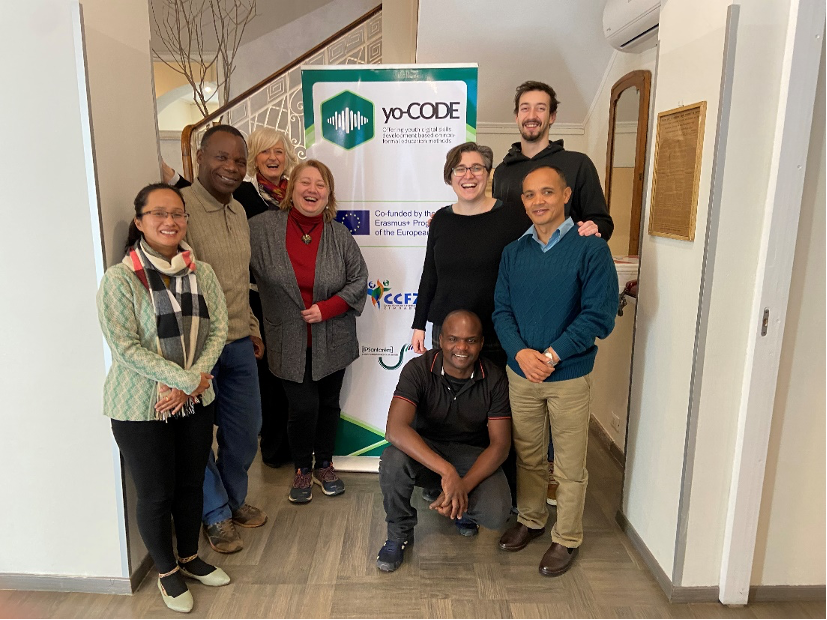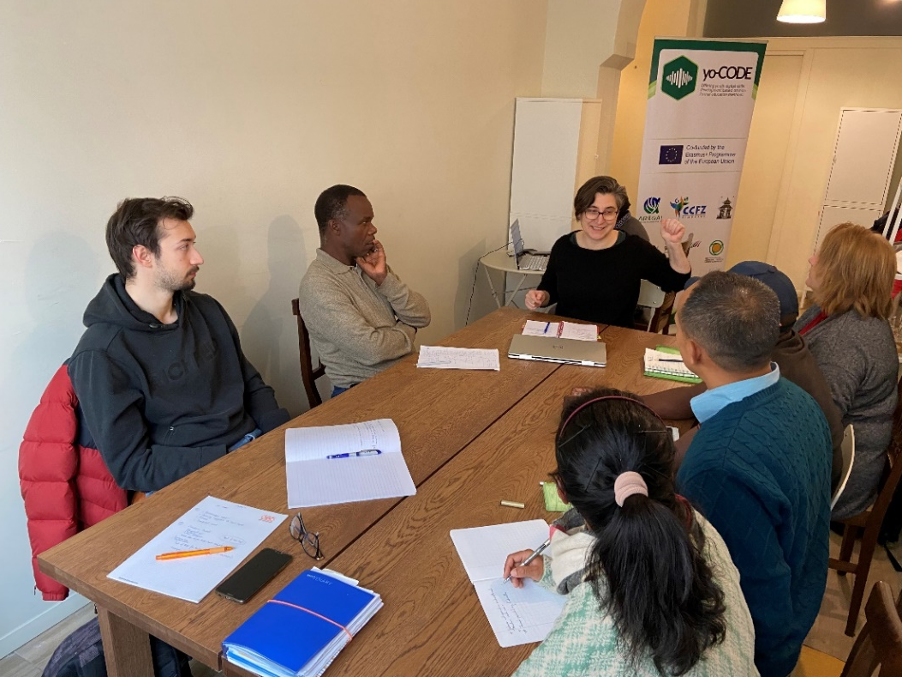Context
We live in an increasingly digital world where people work, socialise, and receive public and private services online. Insufficient individual digital skills probably will have a negative impact on people’s employability and life quality. The exclusion carries a series of deteriorations in life paths like poor health, poor lifelong earnings and an increased risk of marginalization. Tackling inequality will make our societies fairer and our economies stronger.

FOCUS ON SUSTAINABLE DEVELOPMENT GOALS FRAMEWORK, TO ACHIEVE Goal 8 on “Promoting sustained, inclusive and sustainable growth, full and productive employment and decent work for all”, with a specific reference to youth with socio-economic barriers.Our overall objective of the collaboration is linked to the ET 2020 policy objective of “Promoting equity, social cohesion, and active citizenship – project participants will take part in the activities in the programme that address their personal development, focusing especially on building their self-confidence, improving attitude and behavior, and enhancing basic skills such as communication, team working, etc.”. With the intended impact on operators and staff in the participating NGOs and organizations, we expect to those operators can provide better training and support to youth in the future.
The target group
ICT skills enhancement and computer learning courses are not accessible to those that left education early or do not possess the economic means to enroll in professional courses. In particular, those that reside in rural areas where schools have limited resources or where the training offer is more limited, face serious challenges to keep up with the technology progress. On the other hand, in big cities, digital, economic, social divide is stronger and it is getting wider. Therefore, Youth with fewer possibilities for improvement of their skills are not prepared to secure a decent job and are vulnerable to poverty and exclusion.
Why digital skills
In the Open Book for Educational Innovation, digital literacy specifically is seeing as a powerful way for youth to develop the key competences for the XXI century. In relation with ICT literacy and computer related skills in the changing digital economies, according to THE JOURNAL TRANSFORMING EDUCATION THROUGH TECHNOLOGY every educator should have comprehensive technology skills, because as computer and associated technologies continue to change and evolve, educators must continue to strive for excellence in their work.
The issue
NGOs and youth associations are the one that can better balance school education deficits, as they are more agile in adapting to society/target group needs. However, to achieve that goal, they need sufficiently trained staff to support youth in their learning process, understand their specific needs, and possess the appropriate tools and skills to increase their ICT levels. With that aim, they need to be able to develop and integrate development projects and look for practices they can use to create inclusive and digitally literate youth communities.
While setting up the consortium the partners listed the following as their main needs:
- understand the key elements of digital competence;
- how to embed them in non-formal activities;
- how to check if their young audiences achieve them;
- what can be used as support for assessment.
The consortium
The partners decided to start the present consortium, to gain a more precise idea on which techniques can be employed to foster digital and ICT skills in youth, especially in some areas of the world that have great disparities among rural and urban areas, as the ones selected for the project. More in particular, they are curious to understand what educators do to support youth in developing their digital skills in their area of action. Partners have been purposefully selected 1 per continent based on these availability of decent/sufficient training/learning possibilities within or outside formal education. The consortium is composed by 6 partners (from 4 continents) with different background and specialization, already active in sustaining and offering support to disadvantaged youth but they need more refined skills and tools to overcome the lack of central support.
The project contributes to the personal and professional development of NGOs and YOUTH OPERATORS working in the participating countries, offering them the possibility to increase their ICT skills and their ability to support disadvantaged youth in the learning process of basic ICT skills. Youth organizations and NGOs lack the technical competency but they already have well-grounded competences in offering nurturing environment to disadvantaged youth and offer program that foster transversal skills with non-formal education methods.
During this capacity building experience, they are willing to:
- Increase EDUCATORS abilities and competences, to enable them to foster ICT skills in non-formal education settings, targeting disadvantages youth
- Research and select methods, tools and educational resources tested in the EU that can be shared and adapted for local use with minimum effort and costs
- Research the impact of the proposed items on the participating organizations and their educators
- Find new possibilities to add the new skills and methods in their actual offer, offering a better service to their audiences
Key Elements
The main innovation of the project is the composition of the partnership and the different approach to social inclusion, digital competences development and non-formal education approach. The consortium will capitalize on the capacity and skills offered by the 6 partners to create methods, tools and educational resources that can be easily used by a variety of actors.
Considering the importance of ICT in the global market and the employment opportunities connected to it, increasing ICT literacy and digital skills is a widespread objective around the world. Thus, this root-based initiative could offer a good starting point for the improvement of further and more articulated learning provision.

Topics for professional development
The participants from the partner’s organizations with the support of the specialized trainers will refine their skills and knowledge in topics as non-formal education techniques, digital and ICT skills, how to empower youth with digital tools and to involve and motivate both youth and local actors/stakeholders in participating more in the local dialogue.
The innovation of the project is based on mixing different tools and items from different official EU or partners’ sources.
- USE OF COLLABORATIVE LEARNING TECHNIQUES, specifically because it helps individual at increase group members’ motivation, help them retain knowledge better, encourages critical thought; and offer a way to benefit from the diversity of knowledge and experience existing within the group.
- COMPETENCE MODEL FOR YOUTH WORKERS TO WORK INTERNATIONALLY used as a model for getting inspiration on the skills educators should/must possess to be more effective in our societies
- DIGITAL COMPETENCE FRAMEWORK FOR EDUCATORS (DigComp_EDU) will guide the partners in the creation of the materials and tools EDUCATORS can use to learn and check their readiness to operate.
- DIGITAL COMPETENCE FRAMEWORK FOR CITIZENS DigComp – Partners will use the already decoded eight proficiency levels, to show educators at the partners’ educators what could be the skills youth can/should develop and have a common and solid idea on what tools and devices can be used and how.
- PARTICIPATING INSTITUTIONS: The staff working in the participating organizations (EU and EXTRA EU both) will increase managerial, organizational and cultural-awareness skills and competences, during all the common activities and meetings. They will also have the possibility to learn more about ICT skills and digital competences development and the improvement will be transferred to all other organizational areas and services provided by the staff and the institution. They will also increase their international visibility.
- EDUCATORS FROM PARTNERS’ ORGANIZATIONS The 22 educators taking part to the mobility (Zimbabwe + Nepal) are the ones that will develop more skills because they are going to be active part of the learning process and be exposed greatly to others’ way of working and to the multicultural environment. By collaborative processes they will increase their competences in non-formal education techniques, project management tools for planning better local activities, engage and support youth in developing key skills and digital ones in particular. The partner’s educators that are not going to participate at the mobility will be also impacted positively, as they will learn from the trained colleagues, reading the project outputs and by applying new educational methods.
- YOUTH IN PARTNERS COMMUNITIES: They are an indirect target group of the project but will be positively impacted by the project via the more refined and solid educators skills and competences. They can count on more efficient support from the better-trained NGOs and their educators. The partners decided not to involve youth in the project mobility, given the limited possibilities some of these Government pose to travelling and, most of all, language barriers. Young people will be included in local activities, as the partners will experiment their newly acquired skills in their everyday activities and services. The cooperation will have an impact on young people and their communities, via the services offered by the partners and the better information let circulating during the project implementation. In addition, they will see that the empowered youth can offer a more efficient support to make the community secure and contribute to the better allocation of the resources.
Learn more about the yo-CODE project here. FOCUS ON SUSTAINABLE DEVELOPMENT GOALS FRAMEWORK, TO ACHIEVE Goal 8 on “Promoting sustained, inclusive and sustainable growth, full and productive employment and decent work for all”, with a specific reference to youth with socio-economic barriers.Our overall objective of the collaboration is linked to the ET 2020 policy objective of “Promoting equity, social cohesion, and active citizenship – project participants will take part in the activities in the programme that address their personal development, focusing especially on building their self-confidence, improving attitude and behavior, and enhancing basic skills such as communication, team working, etc.”. With the intended impact on operators and staff in the participating NGOs and organizations, we expect to those operators can provide better training and support to youth in the future.
FOCUS ON SUSTAINABLE DEVELOPMENT GOALS FRAMEWORK, TO ACHIEVE Goal 8 on “Promoting sustained, inclusive and sustainable growth, full and productive employment and decent work for all”, with a specific reference to youth with socio-economic barriers.Our overall objective of the collaboration is linked to the ET 2020 policy objective of “Promoting equity, social cohesion, and active citizenship – project participants will take part in the activities in the programme that address their personal development, focusing especially on building their self-confidence, improving attitude and behavior, and enhancing basic skills such as communication, team working, etc.”. With the intended impact on operators and staff in the participating NGOs and organizations, we expect to those operators can provide better training and support to youth in the future.
